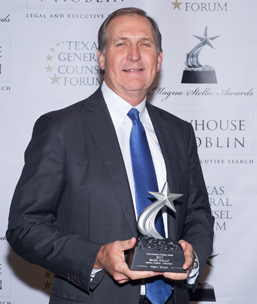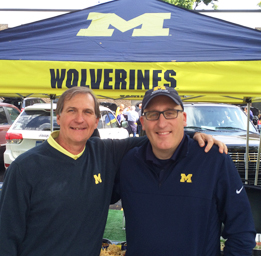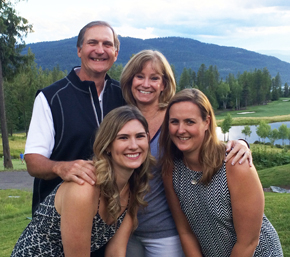
HOUSTON – Robb Voyles has been the general counsel of Halliburton for less than four years, but he has faced a plethora of monumental legal issues that most corporate lawyers don’t see in a lifetime.
Since becoming the chief lawyer at the Houston oilfield services giant in 2014, Voyles has guided Halliburton through treacherous legal waters that included a mountain of lawsuits with billions of dollars at stake related to the Macondo well and Deepwater Horizon deadly explosion, a global securities class action lawsuit, a nine-figure tax dispute with its former KBR subsidiary and a $28 billion merger with Baker Hughes that went bad.
During the same time period, oil and gas prices plunged, requiring major budget cuts and staff reductions within Halliburton’s legal department.
But in those four years, Voyles dramatically reorganized his 125-member legal team, won or favorably resolved nearly all of the company’s most serious litigation threats and turned a corporate conglomerate once widely criticized for its cowboy attitude into a poster-child for corporate compliance.
“My best day at Halliburton was the day I started,” Voyles told The Texas Lawbook in an exclusive interview. “I knew there would be huge challenges – and there definitely have been many – but I realized I now had a seat at the table where decisions were being discussed and made.
“I like being more than just a legal adviser – I like helping resolve problems and being part of the decision-making process,” he said.
Voyles’ successes have been so extraordinary that his peers at the Texas General Counsel Forum, an organization of 700 senior corporate legal officers in the state, earlier this month recognized him its Magna Stella Award for Outstanding General Counsel of the Year for a large corporate legal department.

“Robb is obviously a hell of a lawyer and GC, but he is also widely recognized as a good and kind-hearted leader,” said Texas GC Forum CEO Lynn Bozalis.
Corporate executives at Halliburton demonstrated their confidence in Voyles in March when the company gave him the additional responsibility of interim chief financial officer.
“Robb likes to joke that he has the longest job title in corporate history – general counsel, executive vice president, corporate secretary and then chief financial officer,” said Halliburton vice president and chief ethics and corporate compliance officer Jeffrey Spalding.
“Robb takes the view that our corporate lawyers must know the business and must take an active role in advising our corporate leaders on substantive issues involving the operations of the company,” he said.
Now age 60, Voyles spent three decades as a trial lawyer at the prominent Houston corporate law firm Baker Botts, where he represented businesses involved in high-stakes legal disputes.
“Robb is a great lawyer and he is wicked smart,” said Baker Botts partner Van Beckwith, who worked with Voyles on several litigation matters. “Robb is able to understand the most complex business and legal issues.”
Beckwith said he worked on a case in which Voyles won the dispute for his client and then the opposing company tried to hire him later for other cases.
“Robb understands the importance of the law and its role in business, and he never forgets the needs of the business and the people involved in the business,” he said.
 A devoted University of Michigan football fan, Voyles loves nearly all sports and plays golf often. Despite moving to Houston four years ago, he remains a big Dallas Mavericks fan.
A devoted University of Michigan football fan, Voyles loves nearly all sports and plays golf often. Despite moving to Houston four years ago, he remains a big Dallas Mavericks fan.
At Baker Botts, he worked in the Dallas and Austin offices and served on the firm’s management committee.
“It is much easier to manage lawyers in a corporate environmental than in the law firm environment,” he said with a laugh. “Did I say that out loud?”
For Voyles, moving from Baker Botts to Halliburton, which was a firm client, seemed like a logical choice.
When Halliburton CEO Dave Lesar announced that its long-time general counsel Bert Cornelison was retiring in 2014, he said the company chose Voyles because he was a great lawyer and already knew the business of the company.
The biggest challenge for Voyles on day one was the dozens of lawsuits pending against Halliburton as part of the April 2010 Deepwater Horizon explosion. The company faced litigation ranging from wrongful deaths and personal injuries to oil spill pollution and contamination.
Billions of dollars were at stake and the company also faced numerous federal and state investigations.
Voyles took a leading role for Halliburton in 2014 and 2015 in settling all Macondo litigation for a reported $1.2 billion.
In August and September 2014, Voyles stepped away from the BP oil spill talks to negotiate a complex settlement agreement between Halliburton and its former subsidiary, KBR, over a dispute related to a tax sharing agreement involving KBR’s spin-off in 2007.
The deal resulted in KBR paying Halliburton $81 million.
At the same time those two high-stakes disputes were underway, Voyles was thrust into an intense decade-long securities class action litigation that accused Halliburton of misleading investors by understating the potential liabilities the company faced from asbestos lawsuits and overstated possible revenues from various engineering and construction projects.
“We took the securities case to the U.S. Supreme Court twice with great success both times and we made good law in doing so,” Voyles said.
 In 2014, the Supreme Court used the Halliburton case to allow businesses to present evidence earlier in litigation that fraud played no role in the decline in the price of the company’s stock.
In 2014, the Supreme Court used the Halliburton case to allow businesses to present evidence earlier in litigation that fraud played no role in the decline in the price of the company’s stock.
As a greatly reduced class size headed for trial in 2016, Voyles and the lead lawyer for the shareholders, David Bois, negotiated a $100 million settlement agreement that ended the potentially dangerous litigation.
“We worked diligently to alleviate the risk involving some of the biggest litigation the company was facing,” Voyles said.
The biggest disappointment of Voyles’ career came in 2016 when Halliburton’s efforts to acquire rival Baker Hughes for $28 billion failed.
“A lot of hard work went into making that transaction happen,” he said. “A combination of delays by the federal government and deterioration of the oil and gas market did us in.
“The truth is, we were a little ahead of our time with that transaction,” he said.
Even as Voyles was fighting these huge legal battles, Halliburton and all oil-related companies were hit with an additional blow in 2015: commodity prices plunged from $100 a barrel to $30 in a matter of months.
Forced to reduce expenses, Halliburton cut staff, including its legal department, which now has 60 lawyers based in Houston and about 40 more lawyers stationed around the globe.
“We became cost conscience and more proficient,” Voyles said. “We are actually a substantially smaller legal department than we were four years ago and our outside legal spend has not changed.
“We have been able to increase our level of service to the company, even as we reduced our size,” he said. “We have revised our bylaws and significantly improved corporate governance.”
One of Voyles’ key moves was to hire Spalding, a former federal prosecutor and nationally recognized corporate ethics expert, to be Halliburton’s chief ethics and compliance officer in 2014.
“Robb made clear to us that corporate compliance and ethics were not to be cut but actually improved during the economic downturn,” Spalding said. “Robb is book smart on the law, but he is even more street smart in making business decisions and he has great instincts.
“Robb is the best boss I have ever worked for,” said Spalding, who also worked as senior counsel for California Senator Dianne Feinstein from 2007 to 2009. “He’s very demanding, but he encouraged us to jump into the deep end of the pool and tackle the big issues.”
Voyles said investing in corporate compliance and ethics is a good long-term business decision.
“Our biggest challenge is keeping up with the growth and business strategy of the company to help our leaders be successful,” Voyles said. “I sleep really well at night, mainly because I’m very tired, but also because we stay on top of our risk and we do what it takes to mitigate or minimize our risks.
“I don’t waste a lot of mental energy worrying about potential problems,” he said.
